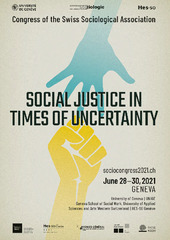| dc.description.abstract | Rather cumbersome ontological situation initiated with the 2020 pandemic has created a great amount of unease within common worlds, particularly in terms of health risks and hazy healthcare instructions. A series of uncanny and confusing moments both have been sparked by possibly deterrent effects coming with infection and transmission risks, as well as by being abridged for effective tools such as standards and procedures for coping with the virus. Exactly this triangle formed between familiar engagements and resettling within pandemic reality, incertitude brought with infection risks and hazy healthcare procedures, along with overall discrepancies in civic response to pandemic, was a principal subject of our research. Namely, we intended to discern how the uncertainty brought with the puzzling intrusion of the COVID-19 was confronted by young professionals in Belgrade, Serbia, particularly having in mind their social status. Based on 20 interviews conducted during the first months of the pandemic in the spring of 2020, our exploration traces both the attempts to consolidate the familiar environment anew into coherent arrangements and to commensurate worths as specific normative principles deployed in these operations. Inspired by pragmatic sociology and more specifically, Thévenot’s concept of regimes of engagement, we first explore the adaptations evolving within familiar arrangements. Principally, we denote that confronting with the uncertainty embodied in a mute presence of the virus meant conducting a fragile politics of beings within this regime, molded through personal bonds, care and intimacy. Particularly, we describe how the hygienic “purifying” was guided not only by a fear of being contaminated, but also has induced a rather vigilant mode of communication with the “intruder” and “drifting” through hazy instructions. Later moment indicates a plurality of assessments of the healthcare itself: for this, highly educated cohort, it meant a critical assessment of instructions, a dose of distrust for medical experts due to fuzzy instructions given in the media and the general reliance on DIY strategy, which involved exploration of “valid” procedures on the Internet. Albeit this lack of referential stability was eventually consolidated into specific pandemic objectivity, surrounded with disinfectants and thresholds put in immediate spaces, a plurality of engagements also evolved into principal tension between this “protective shield” in which the domestic world was wrapped and the civic world. The second problem that we analyze therefore encompasses a commensuration of worth performed by our informants and their judgmental attitude towards actions that might harm the familiar arrangement. Namely, our findings show that
this purifying politics targeted a situated, materialized endeavor in order to solve the basic tension: how to protect and solidify familiar environment by drawing upon an ethical corpus of “taking care of family”. Thus, in conclusion we illustrate how this “pandemic deontology” involved a tense encounter with “aberrations” found in civic polity as these, assumedly, have distorted the common principle of equivalence. Specifically, we describe three major criticisms targeting the civic world: excessive hoarding of goods, improper wearing of masks and a lack of responsibility for others. Overall, these critiques targeting the civic world have both put to scrutiny the healthcare system in Serbia seeing it as unreliable, but also had an aim to protect it against excesses that would further harm it. | sr |

